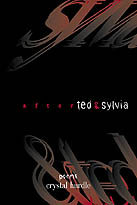After Ted & Sylvia

After Ted & Sylvia
by Crystal Hurdle
$15.95
- Autumn 2003
- ISBN 978-1-55380-010-1
- ebook ISBN: 978-1-55380-364-5
- PDF ISBN: 978-1-55380-365-2
- 6″ x 9″ Trade Paperback, 176 pages
- Poetry, Sylvia Plath, Ted Hughes
- Out of Print
One of the greatest mad, sad literary love affairs of the twentieth century was that between poets Sylvia Plath and Ted Hughes. In her collection of poems, Hurdle adapts her own research on their lives to explore the love and loss in this relationship of poetic collaboration and rivalry, which lasts, in Hurdle’s recreation, even after Plath’s suicide in 1963 and Hughes’ death in 1998. At points, the poet-narrator forms a literary ménage à trois with the two poets as she struggles obsessively to understand their own lives as individual artists and their love-torn relationship.
In the final sections, the envious poet-narrator loses her privileged place as the lover of both Ted and Sylvia. Other voices, including those of family members, a late night talk show host, a holocaust survivor, and literary critics, address Plath, whose poetry has now entered the wider public domain. For the reader, there is the great joy of finding familiar images from both Plath and Hughes, but images that echo with a new resonance:
The clock ticks.
Outside no star shines
And the thought-fox screams its abandonment
as it circles
three-legged and bloody
in the snow.
Reviews:
“Crystal Hurdle has spent years passionately searching for Sylvia Plath and rescuing her from the suppression and distortion of her life and works by others. Hurdle approaches Plath through many perspectives, several voices, and an array of moods. The result is a credible and deeply moving presentation of ‘the heart’s shivered core.’ This is a book to treasure and reread many times.”
—Bill Schermbrucker“In this book of linked poems, Crystal Hurdle channels the many voices that comprise the hardest, brightest stars in the constellation of Sylvia Plath’s life. This is an accomplished first book that combines scholarly and poetic responses to Sylvia Plath’s life and work.”
—Sharon Thesen



